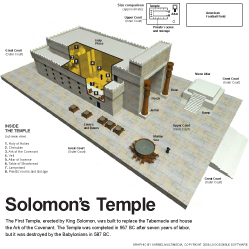24:title–10 Like Psalm 15, this is a temple entry psalm. Here it is not just the worshiper who enters the temple, but Yahweh Himself. The psalmist begins with a statement of Yahweh’s supremacy over creation (vv. 1–2), then discusses the external and internal purity requirements of the worshiper (vv. 3–6). Finally, he describes the entry of Yahweh, the victorious King (vv. 7–10). |
 Types of Psalms Table
Types of Psalms Table
24:title A psalm of David See note on 3:title.
24:1 earth is Yahweh’s The psalm begins by asserting Yahweh’s rule over the earth.
24:2 on the seas Reflects the ancient Near Eastern belief that the earth was supported by pillars sunk into the sea or floated upon the sea (104:5; 1 Sam 2:8).
24:3 Who may ascend Worshipers visiting the temple likely asked this question (see 15:1 and note).
the mountain of Yahweh Refers to the Temple Mount in Jerusalem (Mount Zion), which Israelites believed was the dwelling place of Yahweh (43:3).
24:4 He who is innocent of hands and pure of heart The requirements for entering the temple are both external and internal (see 15:2 and note). The Hebrew word for “clean” (naqi) means “innocent” (10:8; Job 4:7). The term “pure” (bar) emphasizes moral purity (see Job 11:4 and note). Purity is a characteristic of God’s Law (Ps 19:8).
does not lift up his soul Along with “pure heart,” this emphasizes the internal requirements of temple entry.
falseness The Hebrew word used here, shawe, meaning “false,” often refers to idols (31:6; Jer 18:15).
does not swear deceitfully This, along with “clean hands,” emphasizes the external purity required for temple entry. See Ps 15:4 and note.
24:5 justice While the description in v. 4 seems to indicate only the perfect can enter the temple, this verse indicates the worshiper receives righteousness and salvation from Yahweh.
24:6 those who seek your face Describes true worshipers (27:8). See note on 4:6. To seek God’s face is to desire to be in His presence (see note on 11:7).
24:7 Lift up your heads The psalmists asks the doors of the temple to open for Yahweh’s entrance. This psalm was most likely used when the ark of the covenant returned from battle (see Num 10:35–36 and note).
returned from battle (see Num 10:35–36 and note).
24:8 mighty in war The psalmist portrays Yahweh, the King of glory, as a mighty warrior (Exod 15:3). Throughout the ot, biblical writers portray Yahweh going out to battle with His people (Deut 20:2–4).
24:10 Yahweh of hosts The Hebrew divine title used here, yhwh tseva'oth—which literally translates as “Yahweh of hosts” or “Yahweh of armies”—has military connotations (1 Sam 17:45). Biblical writers often used this title in connection with the ark of the covenant (1 Sam 4:4; 2 Sam 6:2), which supports the idea that Israelites used this psalm as the ark entered the temple (see note on Ps 24:7).

|
About Faithlife Study BibleFaithlife Study Bible (FSB) is your guide to the ancient world of the Old and New Testaments, with study notes and articles that draw from a wide range of academic research. FSB helps you learn how to think about interpretation methods and issues so that you can gain a deeper understanding of the text. |
| Copyright |
Copyright 2012 Logos Bible Software. |
| Support Info | fsb |
 Loading…
Loading…


